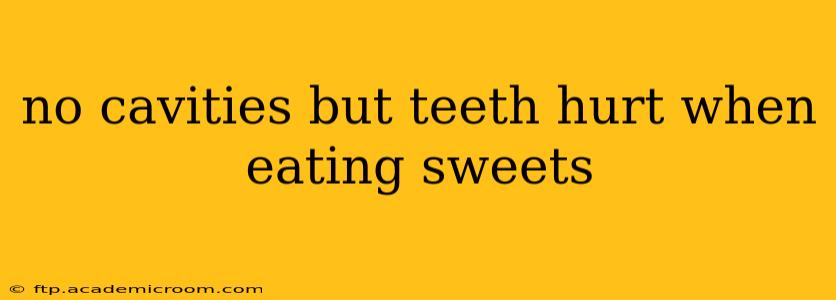Many people experience tooth sensitivity, even without visible cavities. That sharp, stinging pain when biting into something sweet can be incredibly frustrating. While cavities are a common culprit, there are several other reasons why your teeth might hurt when consuming sugary treats, even if your dentist has given you a clean bill of health. Let's explore these possibilities.
Why Do My Teeth Hurt When I Eat Sweets, Even Without Cavities?
This is a frequently asked question, and the answer often lies beyond simple decay. Here are some key explanations:
1. Enamel Erosion:
Enamel, the hard outer layer of your teeth, protects the sensitive dentin underneath. Frequent consumption of acidic foods and drinks, including sugary sodas, juices, and even some fruits, can gradually erode enamel. This thinning of enamel exposes the dentin, making your teeth more sensitive to temperature changes and sweet, acidic, or cold foods. The pain you feel is a signal that your enamel is compromised.
2. Exposed Dentin:
As mentioned above, the dentin is softer than enamel and contains microscopic tubules that lead to the tooth's nerve. When enamel wears away, these tubules are exposed, making them highly sensitive to stimuli. Sugary foods, with their acidity, can further irritate these exposed tubules, leading to pain.
3. Gum Recession:
Gum recession, where your gums pull back from your teeth, exposes the roots of your teeth. The roots are not covered by enamel and are significantly more sensitive than the crowns of your teeth. Eating sweets can irritate the exposed root surfaces, causing pain. Gum recession can be caused by aggressive brushing, gum disease (gingivitis or periodontitis), or genetics.
4. Cracked Teeth:
Even microscopic cracks in your teeth can cause sensitivity. These cracks may not be visible to the naked eye but can allow sweets and other substances to reach the sensitive inner layers of your teeth, causing pain.
5. Tooth Sensitivity Due to Grinding or Clenching:
Bruxism, the habitual grinding or clenching of teeth, particularly at night, can wear down enamel and expose the dentin, making teeth more sensitive to sweets and other stimuli.
6. Recent Dental Work:
If you've recently had dental work, such as fillings or crowns, temporary sensitivity is common. This usually subsides within a few days or weeks, but if the pain persists, it's essential to consult your dentist.
7. Worn-Down Fillings:
Older fillings can wear down over time, creating gaps that allow sugary substances to reach the underlying tooth structure. This can lead to sensitivity and potential secondary decay.
What Should I Do If My Teeth Hurt When I Eat Sweets?
If you're experiencing tooth sensitivity despite the absence of cavities, here's what you should do:
- Schedule a dental checkup: A professional examination can help determine the underlying cause of your sensitivity. Your dentist can conduct a thorough assessment, identifying any issues such as enamel erosion, gum recession, or cracked teeth.
- Reduce sugar intake: Limit your consumption of sugary foods and drinks. This will help protect your enamel and reduce irritation of sensitive teeth.
- Use desensitizing toothpaste: These toothpastes contain ingredients that can help block the tubules in your dentin, reducing sensitivity.
- Practice good oral hygiene: Brush twice a day with fluoride toothpaste, floss daily, and use a mouthwash as directed by your dentist.
Remember, consistent dental care is crucial for maintaining healthy teeth and gums. Ignoring tooth sensitivity can lead to more serious problems down the line. Consulting your dentist is the best way to address the issue effectively and prevent further complications.
